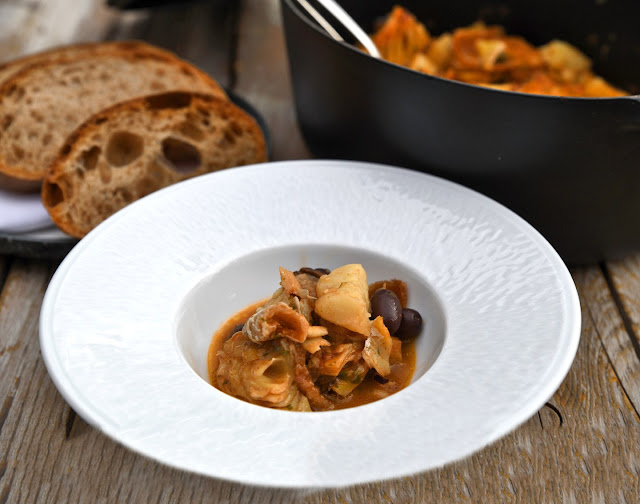Long live buridda!
Though in
Liguria the word buridda is instantly associated with stockfish or
cuttlefish, there is much more to know about it. Buridda, in fact,
probably derives from the Arabic language: it also influences the Provençal bourride,
and its meaning hints at boiled stews. This symbol of Ligurian traditional
cuisine, in fact, was a mixture of fish cut into small pieces (conger eel,
dogfish, whatever the sea provided), stewed with olive oil, pine nuts,
mushrooms, capers, parsley and/or other flavourings. Poor, humble, tasty fish -
nothing is wasted in Liguria.
Today it is
cooked mainly with stockfish or cuttlefish. The use of peas or artichokes also
depended on the different seasonality of the vegetables. In the Savona area,
old recipe books did not mention mushrooms, onions and carrots, but chard, olives
and anchovies - thus differentiating the local version of buridda from
the Genoese one. Sometimes a few anchovies are added and stir-fried with the
other ingredients.
As for
stockfish, in the first half of the 15th century, Venetian captain Pietro Querini
was shipwrecked close to the Lofoten islands, where he had to remain for a few
months due to adverse weather conditions... On his return Querini drafted a
detailed report for the Serenissima, and described a stockfish recipe in which:
"they beat them with the back of an axe, shredding them like strings, then
mix in butter and spices to add flavour". Venetians understood the
potential of stockfish, as their fierce rivals, the Genoese... In 1476, a young
Columbus embarked in Noli on a merchant flotilla bound for Flanders. In 1927,
Spanish historian Cuneo Vidal wrote that Columbus also had to buy batches of
stockfish to be imported into Italy. Northern cod merchants landed mainly in
the port of Imperia: Pieve di Teco and Badalucco were the hubs whence it was
brought to Padania. In Badalucco, inhabitants survived a Saracen siege for
weeks feeding on precious stockfish.
Nowadays, buridda,
stockfish and brandacujùn are symbols of Ligurian cuisine. Ideal wine
matching calls not only for great whites like Pigato, but also reds like
Rossese or Ormeasco. Buridda is no longer the lean dish of Fridays, the
preparation being too long, but the dish of festivity, of tradition, of a past
that has become history.
My English abstract of the article published in Liguria Food
This is the fascinating world of tastes and crafts that LiguriabyLuisa discloses to foreign markets and buyers (tour operators, travel agencies, organizations, associations, food&wine dealers and import/export professionals....).
Contact me and detail your queries



Comments
Post a Comment